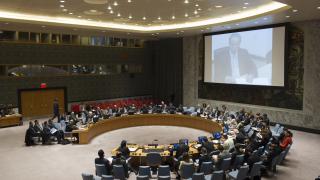
On 16 June the United Nations Human Rights Council (HRC) endorsed the ‘Guiding Principles on Business and Human Rights: Implementing the United Nations ‘Protect, Respect and Remedy’ Framework’. Proposed by UN Special Representative John Ruggie, the Guiding Principles are the result of six years of work and consultation. Alongside this landmark resolution, the HRC also established a Working Group tasked with disseminating and implementing the Principles, and a forum for discussing trends and challenges.
The Guiding Principles are an attempt to address the wide variety of human rights violations committed by transnational corporations, particularly in conflict zones. They also reflect the growing trend of human rights issues entering forums outside of the traditional individual-state relationship, as well as the UN’s more inclusive approach to engagement with the private sector. The UN Global Compact initiative, established in 1999, is another high-profile UN enterprise which sets out corporate social responsibility norms through a voluntary agreement. So why do we need both?
Established in 2008, the ‘Protect, Respect and Remedy’ Framework on which the Guiding Principles are based, includes three key pillars:
- Governments have a duty to protect individuals and communities from human rights abuses.
- Businesses have a responsibility to respect human rights.
- Victims should have recourse to remedy for human rights abuses.
Although the Global Compact shares many of the same values as the Guiding Principles, it only targets corporate governance. The Guiding Principles however, advocate for the dual responsibilities of both companies and states. In respect of companies, the Principles introduce a ‘Human Rights Due Diligence’ process which recommends the implementation of grievance mechanisms. Meanwhile for states, the Principles advocate for much stronger domestic law, and extra-territorial jurisdiction for abuses in conflict zones.
The third pillar – access to justice – was singled out as the most crucial, and vulnerable, aspect. For the Guiding Principles to realise this vital goal it was seen by many as essential that an enforcement mechanism was established. Unfortunately it was not. The UK general comment at the HRC highlighted this significant omission, stating that the UK “does not consider that there is a general State duty to protect under the core United Nations human rights treaties, nor that such a duty is generally agreed to exist as a matter of customary international law”.
It is important to note that, despite criticism, this initial step is a pioneering move towards tackling corporate human rights abuses. Although other standards do currently exist, notably the OECD Guidelines for Multinational Enterprises, the Guiding Principles are the only internationally authorised set of standards in the field of business and human rights. Furthermore, the HRC’s endorsement could not have been stronger. This was the first time the HRC has adopted a text which was not drafted by the Member States themselves, indeed adopting it unanimously, sending a strong message to corporate human rights violators. Paragraph four of the resolution foresees the future strengthening of the Guiding Principles, stating that they provide a basis “on which further progress can be built”. In the meantime, they provide a robust set of standards by which all states and businesses can be measured.
Hayley Richardson has a degree in history from the University of Southampton and is Administrative Assistant at UNA-UK.




















